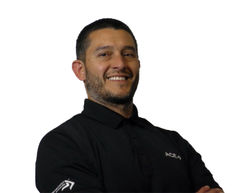Rapport is defined as an active, ongoing process, where two or more individuals create a harmonious relationship. This relationship is based on mutual trust and the understanding that all parties involved have (each) other's best interest in mind.
ACE takes the stand that rapport building should be the foundation of every client interaction.
This blog features four reasons to focus on rapport building with your clients.
1) Building rapport enables you to understand what is most important to the client, and this allows you to guide them in building their best path toward their vision.
- Every client you interact with will be different, and as such, your approach to each client should honor their individuality and respect their autonomy. When you demonstrate genuine empathy and strive to view your client as a unique being, you communicate that they are the expert in themselves. Acknowledging this fundamental principle allows you, the health and exercise professional, to leverage your client's strengths and wisdom. This fosters a growth environment where your clients can safely explore all the possibilities available on their journey toward self-improvement.
2) Building rapport requires you to be present for your client, free of the mind chatter and self-talk that can hinder a collaborative relationship.
- Listen actively to your client's needs, desires, and concerns to best understand their “why." Every client interaction is an opportunity to support their journey towards self-improvement. It is all about them, not you. This requires you to be comfortable with not having or providing all the answers but knowing instead what questions to ask, and how to connect a client's words to their values and vision for a better future. When you suspend judgment and quite your mind, you can focus on the client in front of you - listening intently to what they say and being aware of what they don't say. Once a client unearths their "why," you can then aid them in discovering their "how."
3) Building rapport allows you to turn the curiosity-dial up and the inform-dial down.
- Resist the urge to be the expert and jump in to save clients who are struggling. Instead, practice silence and allow clients to sit with the discomfort. Ask powerful open-ended questions that invite the client to share their unique experiences and perspectives, then step back and allow clients to share their lives with you. Accept what you hear with an open, judgment-free posture- this is called unconditional positive regard. Avoid any demonstrations of criticism or disappointment, both verbally and non-verbally. If a client does not believe you are on their side, they will be less likely to share openly. Seeking to point out a client's shortcomings will lead to an unsuccessful client-professional relationship. Unfailing positive regard is the key to establishing rapport and trust.
4) Building rapport invites you to demonstrate gratitude towards your client.
- Clients are the reason we exist. Serving others is a calling, and it taps into your nurturing personality. Saying to your clients “thank you for speaking with me today,” “thank you for trusting me to go on this journey with you,” “thank you for being present and vulnerable today,” “ thank you for being courageous,” expresses to your client that without them, there is no you (or us as a collective of health and exercise professionals).
Building rapport with your clients begins with you. Your self-talk, any limiting self-beliefs you have about your ability to provide value to your clients, can either make or break the client-professional relationship that predicts client success. However, when you place the ego aside and focus on the person in front of you and how you can provide value to their life, you are on the path to building a trusting client relationship. This, in turn, will lead to a fulfilling career filled with understanding, collaboration, curiosity, and gratitude.




 by
by 






 by
by